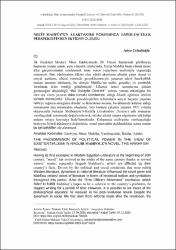Necîp Mahfûz’un Ayaktakımı Romanında Varoluşculuk Perspektifinden İktidar Olgusu
Künye
ÇELENLİOĞLU, Asiye. "Necîp Mahfûz’un Ayaktakımı Romanında Varoluşculuk Perspektifinden İktidar Olgusu". e-Şarkiyat İlmi Araştırmalar Dergisi, 12.4 (2020): 1228-1239.Özet
İlk örnekleri Modern Mısır Edebiyatında 20. Yüzyıl başlarında görülmeye başlayan roman sanatı, aynı yüzyılın ortalarında, Necîp Mahfûz başta olmak üzere ülke gerçeklerinden esinlenerek ürün veren yazarların eserleriyle olgunluğa erişmiştir. Batı edebiyatına hâkim olan edebi akımların altında yatan siyasî ve sosyal şartların, ulusal zeminde gerçekleşmesiyle yaşanan edebî hareketlilik roman sanatını etkilemiş, bu süreçte Mahfûz’un tarihi, gerçekçi ve sembolik formlarda ürün verdiği görülmüştür. Ülkenin temel sorunlarına çözüm getireceğini düşündüğü “Hür Subaylar Devrimi” sonrası yazma etkinliğine bir süre ara veren yazarın daha sonraki ürünlerinde, aldığı felsefe eğitimin izlerini sürmek mümkündür. Ülkede gerçekleştirilen reformlarla sosyal hayatta yaşanan ivmeye rağmen süregiden iktidar ve demokrasi sorunu, bu dönemde kaleme aldığı romanların ana sorunsalını oluşturur. Söz konusu çalışma yazarın 1977 yılında okuyucuyla buluşan Melhemetu’l-Harâfîş (Ayaktakımı Destanı) adlı romanını varoluşçuluk zemininde değerlendirerek, iktidar adalet yaşam olgularına yüklediği anlamı ortaya koymayı hedeflemektedir. Çalışmada edebiyatta varoluşçuluğu besleyen felsefi düşünceye değinilmiş, temel prensipler açıklandıktan sonra roman bu perspektiften ele alınmıştır. Having its first examples in Modern Egyptian Litterature at the beginning of 20th century, “novel” has evolved in the midst of the same century thanks to several writers’ works, especially Naguib Mahfouz’s, which are affected by their country’s facts. Driven by the political and social conditions that were ruling Western literature, dynamism in national literature influenced the novel genre and Mahfouz created pieces of literature in forms of historical realism and symbolism throughout this period. After the “Free Officers Movement” revolution, which failed to fulfill Mahfouz’s hopes to be a solution to the country’s problems, he stopped writing for a period of time. However, it is possible to see traces of the philosophical education he received in his post-revolution novels Despite the dynamism in social life that stem from reforms made after the revolution, the ongoing problem of political power and democracy remained as the main theme
of his novels written at that time. This study aims to review the writer’s novel
Melhemetu’l-Harâfîş, which was published in 1977, on existential grounds and
thus present the meaning it attributes to political power, justice and life. In this
study we described philosophical thought generating existentialism in litterature,
and examined the novel in that aspect after explaining the main principles.
Kaynak
e-Şarkiyat İlmi Araştırmalar DergisiCilt
12Sayı
4Bağlantı
https://dergipark.org.tr/tr/pub/sarkiat/issue/59182/796565https://hdl.handle.net/11352/3674



















